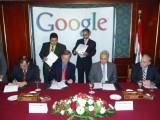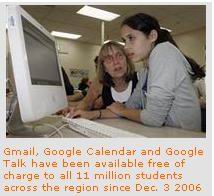Archive for the ‘Email’ Category
Google announces partnerships with Egypt’s Education Authorities

Google today announces that it is providing Egypt’s Ministry of Higher Education the ability to offer the university’s 3 million students and Ministry of Education’s 8 million preparatory students Google applications for email, instant-messaging, and calendar.
As part of Google Apps for Education, Google’s set of hosted communications services, Gmail, Google Calendar and Google Talk will be free of charge to all 11 million students across the region from December 3rd, 2006. The system brings many benefits to students in Egypt, including 2 gigabytes of email storage per student, powerful search capabilities to help locate important messages, enhanced spam filtering, and calendars that can be easily shared with friends and across groups.
 Both Egyptian Ministries are the first organisations to implement Google Apps for Education in the region. “We are delighted to be able to offer our students access to Google’s unique suite of communication tools,†says Dr. Hany Helal, Minister of Higher Education. “We believe that strategic alliances with technology leaders like Google are key to accelerating the contribution that technology can make to the education in Egypt.†“We are very excited about this collaboration with Google” says Dr. Yousry El –Gamal, Minister of Education, and “it will encourage all preparatory school students to use the internet as well as give them a sense of belonging to an online student community.â€
Both Egyptian Ministries are the first organisations to implement Google Apps for Education in the region. “We are delighted to be able to offer our students access to Google’s unique suite of communication tools,†says Dr. Hany Helal, Minister of Higher Education. “We believe that strategic alliances with technology leaders like Google are key to accelerating the contribution that technology can make to the education in Egypt.†“We are very excited about this collaboration with Google” says Dr. Yousry El –Gamal, Minister of Education, and “it will encourage all preparatory school students to use the internet as well as give them a sense of belonging to an online student community.â€
Dr. Eric Schmidt, Chairman of the Executive Committee and Chief Executive Officer, Google says “As a company, it has been our mission to provide greater access to the world’s information, including personal information. We are delighted that our communication and collaboration tools will enable millions of students in Egypt to keep track of class and activity schedules and stay in close touch with their classmates and teachers. By using Google Apps for Education, Ministries of Education and Higher Education can focus on more pressing technology projects that benefit the school and students.”
Beginning December students logging into the current student email system will be presented with the option to begin using the new services from Google immediately. The service does not require installation or maintaining of any additional hardware or software.
The Google Apps for Education platform, which is hosted by Google and available to users via any web-connected PC, includes the following services:
Gmail – This web-based email program provides 2 gigabytes of storage, powerful spam filtering, and search tools to help users find information quickly. The Gmail interface includes instant messaging right from within your messages and contact list. POP is available for users that would like to send and receive mail from a desktop application rather than Gmail’s web interface. Gmail is available in 40 languages. Google Calendar – This online calendar program makes it easy for people to organize the events in their lives and to share their schedules with others. Google Calendar helps people set up appointments with each other and even publish events on the web. Calendar is available in 17 languages.
Google Talk – This free download lets users conduct PC-to-PC voice calls and send instant messages to each other for free. Google Talk is available in 14 languages.
Google Page Creator – This what-you-see-is-what-you-get web page authoring tool lets domain administrators build simple web pages for their domain, and publish them to the web even if they don’t have any website building experience. Page Creator is available in US-English.
Original Story Link – http://business.maktoob.com/educationnew.asp?id=20061207052249
eSchool News Onlin e- Report: Students struggle with information literacy
Many students know how to use technology, but fewer know how to apply it to find what they’re looking for
By Justin Appel, Assistant Editor, eSchool News
Despite the assumption that today’s students are tech-savvy, many fall short in demonstrating the information literacy skills necessary for success in college and the workforce, a new report says. The report comes from an evaluation of responses from students nationwide to an information-literacy assessment tool developed by the nonprofit ETS.
November 28, 2006—We often think of today’s students as technology-savvy–and while that might be true, to a certain extent, when it comes to using hardware and software devices, a recently published report shows how little know-how students display when it comes to information literacy, or the ability to use technology to find the information they’re looking for.
The report, from Princeton, N.J.-based ETS, found that the majority of high school and college students lack the proper critical thinking skills when it comes to researching online and using sources.
The report comes from an evaluation of the responses of 6,300 students from 63 institutions around the country to ETS’s new ICT (Information and Communications Technology) Literacy Assessment. Students were given scenario-based items that were presented to them in 75-minute test environments. These information literacy tests included extracting information from a database, developing a spreadsheet, or composing eMail summaries of research findings.
The tests are meant to measure students’ abilities to overcome three challenges they typically have:
“The ability to identify trustworthy and useful information;
“The ability to manage overabundant information; and
“The ability to communicate information effectively
The study found that 52 percent of those tested could correctly judge the objectivity of a web site, and 65 percent could correctly judge that web site’s authoritativeness. But only 40 percent of students entered multiple search terms when researching a topic, and only 44 percent properly identified a statement that captured the demands of the assignment.
“We have a kind of wake-up call that’s being presented to all of us at this time,” said Mary Ann Zaborowski, executive director of product management with ETS. “When we think about students today, they’re the millennium children. They’ve grown up around technology. They’ve been automated with all kinds of computers, cell phones, digital cameras, music. They’re more well-versed than any of us who preceded them in terms of how to use these devices. But where there’s a startling gap is in their ability to cognitively apply this technology in meaningful ways.”
The results might be surprising to those outside the educational world, who might think that students who grew up with the internet in their homes and schools are naturally adept at navigating their way around the World Wide Web; but to those in education, it is something they have either suspected or known for quite some time.
“I’m not surprised. I think it’s not just a problem specific to a region,” says Della Curtis, coordinator of library information services for Baltimore County, Md., Public Schools. “I think it’s a national issue, for which there have been many organizations that have prepared reports on 21st-century literacy, from way back.”
One of the problems, Zaborowski points out, is students’ over-reliance on search engines such as Google when it comes to researching topics. The study found that students typically will type in a search keyword, then simply go to the first search result and use it as an authoritative source. The problem with this approach is that a number of top search results on Google are often slanted or biased. Through a process known as “Googlebombing,” people can alter the top results for a search term. For example, when you type the word “failure” into Google’s search engine, the top result that appears is the White House biographical page for President George Bush.
ETS hopes educators can learn from its report. School leaders “can use the results to identify the misconceptions that faculty might have about the competency of their students,” said Zaborowski. Then, she said, educators can “build a consensus on revisions to their curriculum to address those gaps.”
Many school districts, such as Baltimore County, are already aware of the information-literacy challenge. To address the problem, Baltimore County has been producing a web-based curriculum that, according to Curtis, “raises the bar on student research and problem solving.”
Through this web-based curriculum, Baltimore County has put together a number of research models for elementary, middle, and high school levels. Each research model has a different scenario and task that students must complete. Students are directed to resources the school system has evaluated, which will help them answer key questions. These resources point students in the right direction when it comes to search methods.
“We feel that this is an effective strategy in integrating information literacy … within the context of the curriculum,” said Curtis.
Although schools strive to improve their students’ information literacy skills, educators must take concrete measures to ensure students have the critical thinking skills they need to find information online, according to the report. “Access to information is becoming a goldmine or landfill,” said Curtis. “We need to develop strategies to integrate information and communications literacy skills within the context of the curriculum.”
Links:
Findings from ETS’s report
http://www.ets.org/ictliteracy/prelimfindings.html
ICT Literacy Assessment
http://www.ets.org/ictliteracy
Original Story Link – http://www.eschoolnews.com/news/showStoryts.cfm?ArticleID=6725